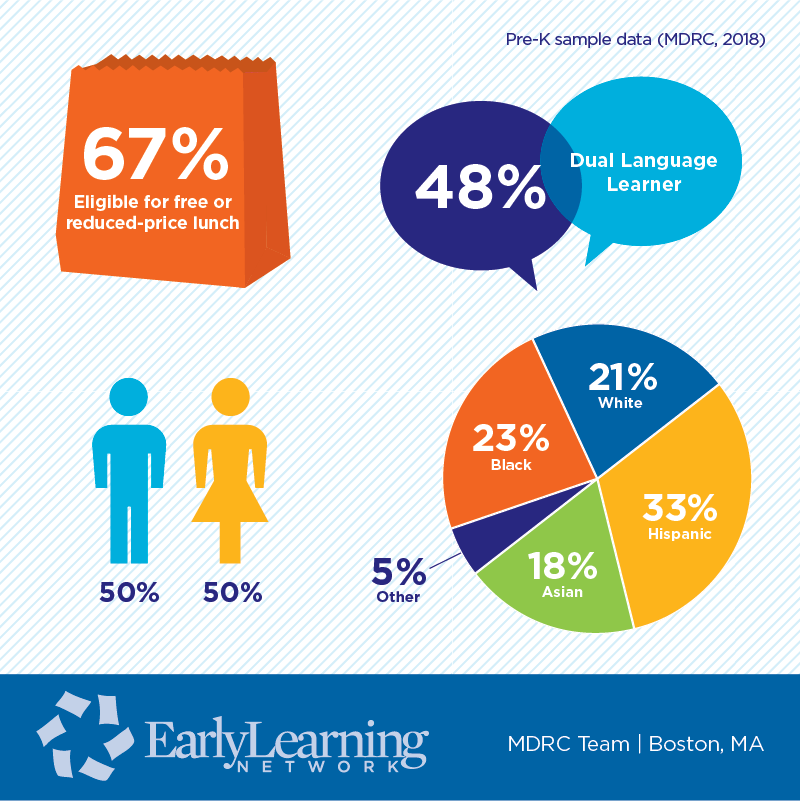
08 Jun Project update: MDRC
Boston P-3: Identifying Malleable Factors for Promoting Student Success
The Early Learning Network’s MDRC team in Boston, Massachusetts, is completing its second year of data collection for the research project: “Boston P-3: Identifying Malleable Factors for Promoting Student Success.” The three-pronged program includes data collection and analyses for a policy and practice study, classroom observation study and a longitudinal study following children as they move from preschool to third grade.
Policy and Practice Study
The team is analyzing data to better understand the development and district-wide implementation of Focus on Early Learning – Boston Public Schools’ curricular and professional development model for pre-K to second grade. The researchers aim to identify key factors related to student experiences that facilitate the model’s implementation across the district, such as instructional content and dosage, teacher practices, instructional approach, school district culture and climate, and attributes of staff, families and students.
This study is expected to be published in mid-2019.
Classroom Observation Study
During the 2017–2018 academic year, the team collected live and videotaped observations of participating classrooms, parent surveys, teacher surveys and teacher reports on students’ social-emotional skills.
Videotaped observations are being coded using the CLASS and the Individualizing Student Instruction observation tools.
Longitudinal Study
The team has also made strides in accomplishing its goals for the longitudinal study, which examines how classroom processes and practices, family engagement in learning activities outside of school and afterschool and summer activities relate to children’s developmental skill trajectories over time and third grade outcomes.
For the 2017-2018 academic year, the team recruited study participants who did not attend Boston Public School’s pre-K program and were enrolling in the district for the first time in kindergarten. The data revealed that these students had been enrolled in a mix of care experiences in the previous year, including formal center-based child care, home-based child care, and staying at home with a parent, relative or family friend. The team collected assessments on these students, as well as the student sample that enrolled in the study in the fall of pre-K (Year 1), in fall 2017 and spring 2018.
The team is exploring associations between malleable aspects of children’s school and home-based learning environments and gains in their academic skills across the pre-K year, as well as examining children’s developmental trajectories across the pre-K year and through the transition to kindergarten.
This summer, the team will turn to further analysis exploring similar associations within the kindergarten year, and also cutting across pre-K and kindergarten.

Measuring teacher fidelity
A significant objective of MDRC’s project is to understand and report on instructional alignment across grades. During the 2016–2017 school year, the MDRC team worked iteratively with BPS district staff to design a tool to measure teachers’ fidelity when implementing the Focus on Early Learning curricular model that is being rolled out from pre-K to second grade across schools.
After being trained to ensure reliability by the MDRC team, the measure was then collected by BPS district staff in participating study classrooms in 20 public schools and ten community-based organizations that were also implementing the BPS model.
The tool’s purpose is to understand whether children’s experiences across the early grades are aligned in terms of what (content of instruction) and how (mode of instruction) they were taught, and the nature of interactions teachers and children have in the classroom. Accordingly, in the last year, the team built on earlier work and developed a tool to measure fidelity of implementation to the kindergarten version of the curriculum.
Although parts of this tool are unique to kindergarten, it allows the researchers to collect items that cut across multiple grades and to assess instructional alignment across early elementary school. BPS instructional staff collected these data in kindergarten classrooms in the winter and spring of 2018, and the findings will be analyzed and shared with BPS staff and teachers prior to the start of the 2019 academic year.
Bringing it all together
The core goal of this effort is to provide relevant information to the district that supports professional development and curricular design. Research findings will provide needed information to the field describing an aligned curriculum, instruction and professional development model across the early grades, while determining the factors that best support developmental outcomes for students.
Learn more about the MDRC research program.

